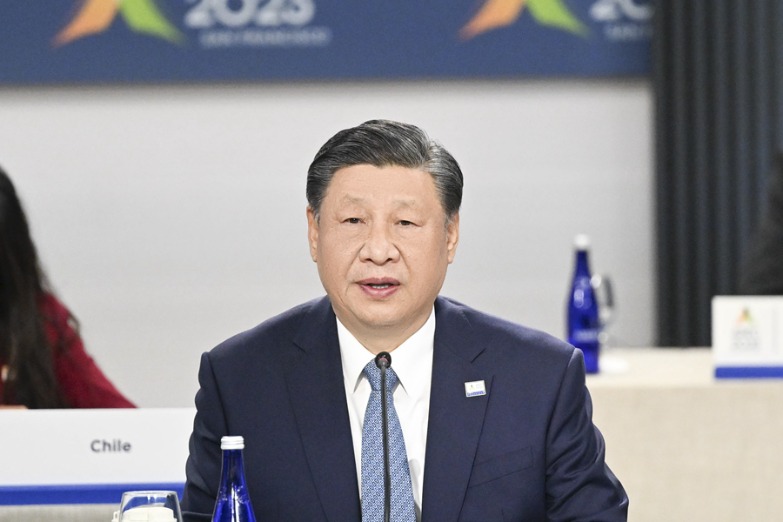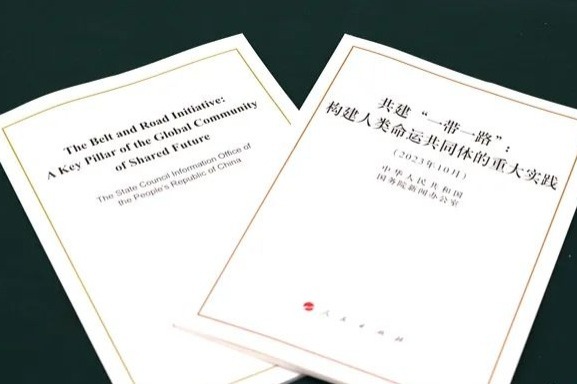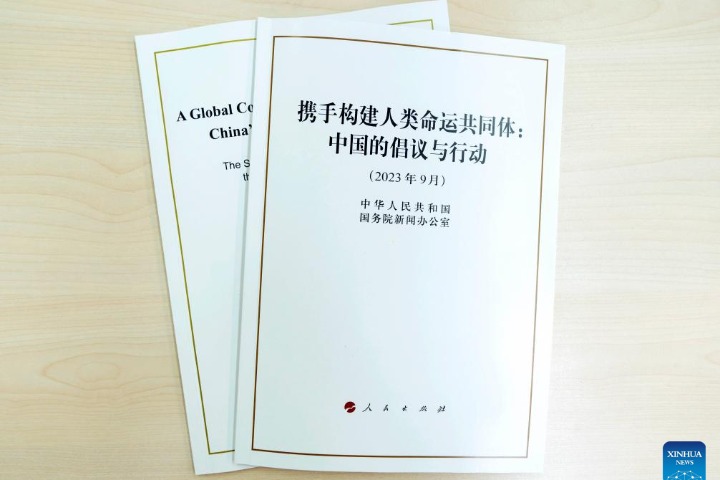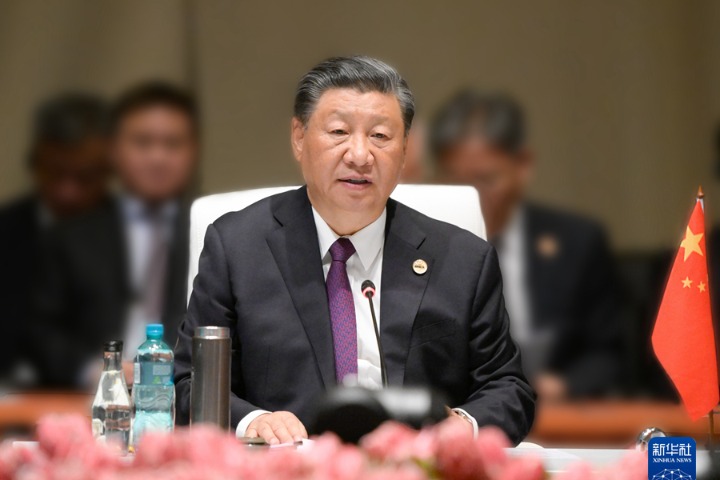《中國的糧食安全》白皮書(雙語全文)
新華網 2019-10-15 13:55

三、對外開放與國際合作
III. Opening Up and International Cooperation
中國積極踐行自由貿易理念,認真履行加入世界貿易組織承諾,主動分享中國的糧食市場資源,推動世界糧食貿易發展。不斷深化糧農領域國際合作,積極參與世界糧食安全治理,為促進世界糧食事業健康發展、維護世界糧食安全作出了重要貢獻。
China is an active promoter of free trade. It has worked hard to fulfill its commitments to the WTO, and shares China's food market resources to facilitate world food trade. By expanding international cooperation in food and agriculture and actively participating in global food security governance, China has made an important contribution to the healthy development of the world food industry and food security.
(一)對外開放日益擴大
1. More areas are opening up
——中國糧食市場更加開放。涉糧外資企業加工轉化糧食數量、產品銷售收入不斷增加,2018年分別占到全國的14.5%、17%。外資企業進入中國糧食市場的廣度、深度不斷拓展,在食用植物油、糧食加工轉化等領域的份額不斷增長,并向糧食收購市場、批發零售和主食品供應等方面延伸,成為促進中國糧食產業發展的重要力量。
- The Chinese food market is more open than before. Foreign-funded enterprises in China have been processing more food, and their revenue from sales is increasing over the years, accounting for 14.5 percent and 17 percent of the national total in 2018. Foreign-funded enterprises are becoming more involved in depth and width of China's food market, with growing shares of business in edible vegetable oil and food processing, and activities extending into procurement, wholesale and retail, and staple food supply. They have become a key force in developing China's food industry.
——認真履行加入世界貿易組織承諾。中國嚴格按照加入世界貿易組織承諾,取消了相關農產品進口配額和許可證等非關稅措施,對小麥、玉米、大米實施進口關稅配額管理,大幅度削減其他糧食品種的進口關稅。進一步放寬農業領域外商投資準入限制,除中國稀有和特有的珍貴品種、轉基因品種之外,將外商投資種業的限制范圍縮減為小麥、玉米,取消農產品收購、批發的外商投資準入限制。
- China has honored its commitments to the WTO. In strict accordance with its commitments upon joining the WTO, China has rescinded import quotas, permits and other non-tariff measures for relevant agroproducts, exercised quota management for imported wheat, corn and rice, and cut import duties on other food types by large margins. It has further eased restrictions on foreign investment in agriculture, allowing foreign-invested seed companies to operate in all grain types other than wheat, corn, and rare species or species unique to China, or genetically modified crops. Restrictions on foreign-invested companies regarding the procurement, processing and wholesale of agroproducts have also been lifted.
——促進國際糧食貿易繁榮發展。中國在確保國家糧食安全的前提下,認真遵守世界貿易組織規則并履行中國加入世界貿易組織的相關承諾,積極與世界主要產糧國分享中國巨大的糧食市場。2018年,包括大豆等油料和飼料在內的糧食進口總量為11555萬噸,出口總量366萬噸,分別比1996年增長944.8%、171.1%。進口總量中大豆8803萬噸;谷物及谷物粉進口2047萬噸,占當年世界谷物貿易量的4.9%。
- China works for the development and prosperity of international food trade. On the precondition of ensuring national food security, China strictly abides by WTO rules and fulfills its commitments to the organization, sharing its huge food market with major food-producing countries. In 2018, China imported 115.55 million tons of oil crops (including soybeans), feed and other foods, and exported 3.66 million tons of food. These figures represented growth of 945 percent and 171 percent over 1996. It imported 88.03 million tons of soybeans, and 20.47 million tons of grains and grain powders, accounting for 4.9 percent of world grain trade in 2018.
(二)國際合作全面加強
2. International cooperation is strengthened in all areas
——主動分享糧食安全資源和經驗。1996年以來,中國與聯合國糧農組織實施了20多個多邊南南合作項目,向非洲、亞洲、南太平洋、加勒比海等地區的近30個國家和地區派遣近1100人次糧農技術專家和技術員,約占聯合國糧農組織南南合作項目派出總人數的60%。積極支持國內有條件的企業“走出去”,秉持共商共建共享原則,在有需要的國家和地區開展農業投資,推廣糧食生產、加工、倉儲、物流、貿易等技術和經驗。截至2017年底,中國農業對外投資存量173.3億美元,在境外設立企業851家,分布于六大洲的100個國家(地區),雇傭外方員工13.4萬人,為東道國增加就業、發展經濟、改善民生作出了積極貢獻。
- Sharing resources and experience on food security with the rest of the world. Since 1996, the Chinese government and the United Nations Food and Agriculture Organization (UNFAO) have jointly implemented more than 20 multilateral South-South cooperation programs, and sent 1,100 agricultural experts and technical personnel to around 30 countries and regions in Africa, Asia, the South Pacific, and the Caribbean, accounting for 60 percent of the total number of personnel dispatched by the UNFAO's South-South cooperation program. It supports competent food enterprises in going global, encouraging them to invest in agriculture in countries and regions where such investment is needed, and share with them technology and experience on food production, processing, storage, logistics, and trade in accordance with the principles of extensive consultation, joint contribution and shared benefits. By the end of 2017, China had a total investment of 17.33 billion US dollars in agriculture overseas, with 851 enterprises operating in 100 countries and regions in six continents and employing 134,000 foreign employees. They have helped these countries and regions create more jobs, develop their economy, and improve peoples' lives.
——不斷深化國際合作。中國與60多個國家和國際組織簽署了120多份糧食和農業多雙邊合作協議、60多份進出口糧食檢疫議定書,與140多個國家和地區建立了農業科技交流和經濟合作關系,與50多個國家和地區建立了雙邊農業合作工作組。中國始終將支持非洲農業發展和糧食安全作為對非合作的優先重點領域。截至2016年,中國共幫助50多個非洲國家實施近500個農業援助項目,包括成套項目、技術援助項目、物資項目等,涉及農業種植、糧食倉儲、農業機械、農田灌溉及農產品加工等領域。2013年以來,中國積極推進共建“一帶一路”,與參與國建立經貿合作關系,推動糧食領域合作。
- Deeper international cooperation. China has signed more than 120 bilateral and multilateral agreements on food and agriculture cooperation with over 60 countries and international organizations, and more than 60 inspection and quarantine protocols for food imports and exports. It has established exchanges in agricultural science and economic cooperation with over 140 countries and regions, and formed bilateral work groups on agricultural cooperation with more than 50 countries and regions. China has always prioritized agricultural development and food security in its cooperation with African countries. As of 2016, China had provided assistance to more than 50 African countries in implementing nearly 500 agricultural programs, including complete projects, technical support and material supply, in the areas of farming, food storage, agricultural machinery, farmland irrigation, and agroproduct processing. Since it launched the Belt and Road Initiative in 2013, China has strengthened trade and economic relations with many participating countries to promote cooperation in the food industry.
——積極參與世界糧食安全治理。積極響應和參與聯合國糧農組織、世界糧食計劃署等涉糧國際組織的倡議和活動。推動增強非洲等發展中國家在涉糧國際組織中的代表性和發言權,支持發展中國家的合理訴求。致力于落實聯合國2030年可持續發展議程,制定《中國落實2030年可持續發展議程國別方案》,發布《中國落實2030年可持續發展議程進展報告》,為其他國家落實工作提供有益借鑒。積極參與國際食品法典、國際植物保護公約等國際規則制定,成功推動世界動物衛生組織、國際標準化組織等10多項農藥殘留國際標準、谷物國際運輸標準、國際貿易糧食檢疫措施標準等國際標準的制定,主導制修訂小麥規格、玉米規格等多項糧食國際標準。牽頭推動亞洲合作對話“糧食、水與能源安全相互關系”工作,積極參與東盟與中日韓10+3大米緊急儲備機制,先后發起或主辦亞太經合組織農業和糧食安全部長會議、二十國集團農業部長會議、金磚國家農業部長會議、中國-拉丁美洲和加勒比農業部長論壇、中國-太平洋島國農業部長會議、世界農業展望大會等重要國際會議,推動各國在糧食安全治理方面形成共識。
- Actively participating in world food security governance. China has actively responded to and participated in the initiatives and activities organized by the UNFAO, the World Food Programme, and other international organizations for agriculture. It has worked to enhance the representation and voice of Africa and other developing countries in international organizations for agriculture, lending support to their reasonable demands. It is committed to implementing the UN's 2030 Agenda for Sustainable Development, and has developed its country program for the Agenda and released a report on its progress for the Agenda, providing beneficial experience for other countries to do their work. China is engaged in the development of the Codex Alimentarius, International Plant Protection Convention, and other international rules. It led the formulation of and revisions to international standards on the specifications of wheat, corn, and other foods, and facilitated the development of about a dozen international standards on pesticide residues, grain transport, and food inspection and quarantine in foreign trade initiated by the World Organization for Animal Health and the International Standardization Organization. In order to push for consensus on food security governance, it took the lead in promoting the Asia Cooperation Dialogue on the relationship of food, water and energy security, and joined the 10+3 rice emergency reserve between ASEAN countries, China, Japan, and the ROK. It has also initiated or hosted APEC ministerial meetings on agriculture and food security, G20 meetings of agricultural ministers, BRICS meetings of agricultural ministers, the China-Latin America and the Caribbean Agricultural Ministers Forum, the China-Pacific Island Countries Agriculture Ministers Meeting, and the World Agricultural Outlook Conference.
——提供力所能及的國際緊急糧食援助。應有關國家緊急糧食援助請求,無償提供力所能及的多雙邊緊急糧食援助,對緩解有關國家人道主義危機、促進世界消除饑餓目標的實現,發揮了積極作用,得到國際社會和有關國家的高度評價。
- Providing emergency food assistance within its capacity. In response to the emergency food needs of other countries, China has provided bilateral and multilateral free emergency food assistance within its capacity, playing a positive role in alleviating humanitarian crises and facilitating global efforts toward eliminating hunger, for which it has won recognition and commendation from the international community.

















 英語點津微信
英語點津微信 雙語小程序
雙語小程序